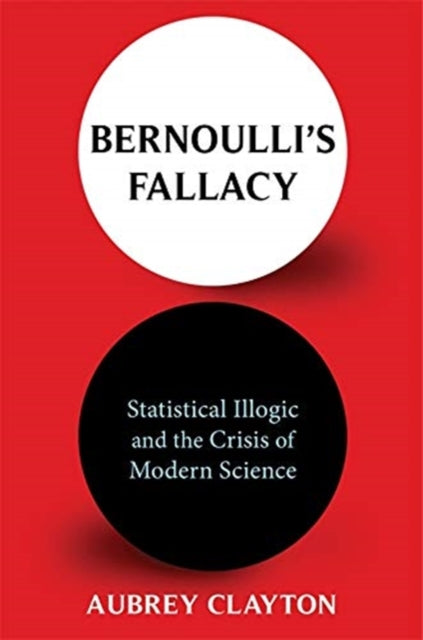Aubrey Clayton
Bernoulli's Fallacy: Statistical Illogic and the Crisis of Modern Science
Bernoulli's Fallacy: Statistical Illogic and the Crisis of Modern Science
YOU SAVE £5.72
- Condition: Brand new
- UK Delivery times: Usually arrives within 2 - 3 working days
- UK Shipping: Fee starts at £2.39. Subject to product weight & dimension
Bulk ordering. Want 15 or more copies? Get a personalised quote and bigger discounts. Learn more about bulk orders.
Couldn't load pickup availability
- More about Bernoulli's Fallacy: Statistical Illogic and the Crisis of Modern Science
The reproducibility crisis in experimental science is due to a misunderstanding of probability and its role in making inferences from observations. Aubrey Clayton traces the history of how statistics went astray, beginning with Jacob Bernoulli's work and winding through gambling, astronomy, and genetics. He highlights how influential nineteenth- and twentieth-century figures developed a statistical methodology they claimed was purely objective to silence critics of their political agendas. Clayton provides a clear account of the mathematics and logic of probability and contends that we need to take a Bayesian approach to resolve the crisis.
Format: Hardback
Length: 368 pages
Publication date: 03 August 2021
Publisher: Columbia University Press
The reproducibility crisis in experimental science, stemming from a fundamental misunderstanding of probability and its role in making inferences from observations, has far-reaching consequences in an increasingly statistics-reliant society. This crisis threatens entire disciplines and shapes decisions in medicine, law, and public policy with profound implications.
The problem's roots can be traced back to the groundbreaking work of the seventeenth-century mathematician Jacob Bernoulli, but it has since evolved through various fields, including gambling, astronomy, and genetics. The history of statistics is marked by rival schools of thought, feuds, and human shortcomings that have contributed to its decline.
In his book, "Bernoulli's Fallacy," Aubrey Clayton delves into the history of how statistics went astray, exploring the influence of influential figures who developed a statistical methodology they claimed was purely objective to silence critics of their political agendas, such as eugenics. Clayton provides a clear account of the mathematics and logic of probability, conveying complex concepts in an accessible manner for readers interested in the statistical methods that shape our understanding of the world.
He argues that we need to adopt a Bayesian approach, which incorporates prior knowledge when reasoning with incomplete information, to resolve the reproducibility crisis. This approach recognizes the importance of considering prior information and updating beliefs based on new evidence, rather than relying solely on statistical significance tests.
Bernoulli's Fallacy spans various disciplines, including math, philosophy, and culture, and offers a comprehensive analysis of why something has gone wrong with how we use data. It provides insights into the limitations of statistical methods and highlights the need for a more nuanced and informed approach to data analysis.
By recognizing the flaws in our statistical methods and adopting a Bayesian approach, we can improve the reliability and validity of our inferences, leading to more accurate and informed decision-making in medicine, law, and public policy. This requires a shift in mindset, where we prioritize the integration of prior knowledge and the consideration of uncertainty in our analysis.
In conclusion, the reproducibility crisis in experimental science highlights the critical importance of understanding probability and its role in making inferences from observations. By adopting a Bayesian approach and recognizing the limitations of statistical methods, we can improve the reliability and validity of our data analysis, leading to more accurate and informed decision-making in medicine, law, and public policy. This requires a shift in mindset, where we prioritize the integration of prior knowledge and the consideration of uncertainty in our analysis.
Weight: 728g
Dimension: 165 x 243 x 29 (mm)
ISBN-13: 9780231199940
This item can be found in:
UK and International shipping information
UK and International shipping information
UK Delivery and returns information:
- Delivery within 2 - 3 days when ordering in the UK.
- Shipping fee for UK customers from £2.39. Fully tracked shipping service available.
- Returns policy: Return within 30 days of receipt for full refund.
International deliveries:
Shulph Ink now ships to Australia, Belgium, Canada, France, Germany, Ireland, Italy, India, Luxembourg Saudi Arabia, Singapore, Spain, Netherlands, New Zealand, United Arab Emirates, United States of America.
- Delivery times: within 5 - 10 days for international orders.
- Shipping fee: charges vary for overseas orders. Only tracked services are available for most international orders. Some countries have untracked shipping options.
- Customs charges: If ordering to addresses outside the United Kingdom, you may or may not incur additional customs and duties fees during local delivery.


